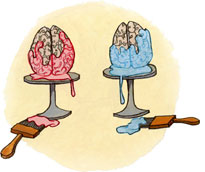
Hi everybody, Kristen Loveland (of Transitioning, formerly called The Choice) here helping to fill in for Deborah a bit over the next two weeks with some cross-posts. It’s always best to start your week off with a little contemplation about how much those pesky, pervasive, much-(statistically)-vaunted “sex differences” between men and women hold water beyond the oversimplified pop study and advertising board room (let’s all take a minute to painfully remember Mel “sugartits” Gibson’s What Women Want movie). In a brilliant move over at Slate, Amanda Schaffer and Emily Bazelon take on the latest literature by the “sex difference evangelists” in a six-part series (click through to read them all and thanks to Daphne Uviller for sending this over!) Looking at everything from language to empathy to hormones to Larry Summers, they ask why there is so much focus on the Mars/Venus dichotomy, and so little on the many variables within a gender. And most happily, instead of taking all the stats and studies at face value, they dig into these researchers’ findings beyond the intro paragraphs.
For instance, they get to the bottom of how significant the difference in empathy is between men and women, noting that by 1987 sex differences were actually only “comparable to the difference in average height between 15- and 16-year-old girls, “though this didn’t stop psychologist Susan Pinker to use these studies to argue “that women have a powerful ’empathy advantage.'” But most significantly, and something I always try to keep in mind when the New York Times flashes the latest stats across its front page, Schaffer and Bazelon point out:
“Of course, what people say about themselves on questionnaires tells a limited story in any case. Psychologist Nancy Eisenberg made this point most dramatically in the 1980s, when she demonstrated that the empathy gap, which appeared in studies that relied on self-reporting, all but vanished when other measures like physiological responses or changes in facial expression were considered. Men and women differ in ‘how empathetic they would like to appear to others (and, perhaps, to themselves),’ she wrote—and that’s not the same thing as real underlying sex differences in empathy.”
Any weekend spent with my sister (my complete opposite in countless ways) very clearly brings the differences within gender home to me. This weekend, this very neatly played out in our contradictory reaction to the very advertising and consumer campaigns that target those so-called differences. Lacking soap, I very naturally picked up my brother’s Old Spice “Vitality” body wash to use. It smelled quite nice, I thought, though I’ll wait for the day when a “woman’s” body wash is tagged as the dynamic “Vitality” as opposed to “soothing,” “calming,” or the it’s-hard-being-a-woman “re-energizing.” As soon as I ran down stairs, feeling quite vital, thank you very much, I was subject to a very big sisterly campaign of: “I can’t believe you just used man-wash. You smell like a man now. Who uses man wash?” Clearly, it was not something she would have even contemplated. Even in our decisions as to how much we will abide by the consumer-minded gender roles, the reactions are variegated, dare we even say, unexpected.


Comments